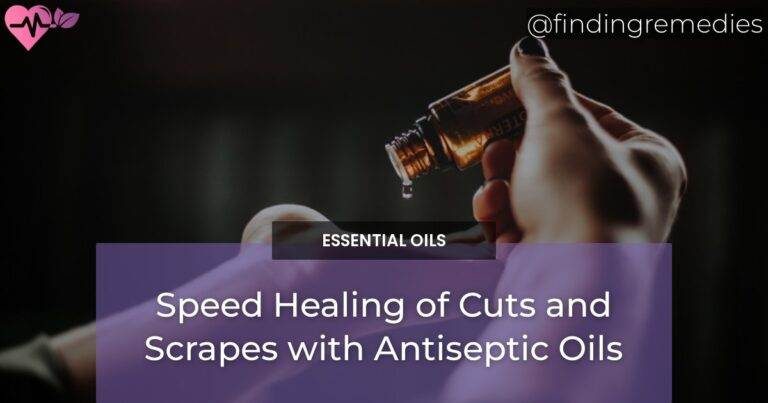When it comes to treating cuts and scrapes, it’s important to not only focus on proper wound care but also on preventing infection. One effective way to speed up the healing process and reduce the risk of infection is by using antiseptic oils. These oils, derived from various plants, have natural antibacterial and antifungal properties that can help protect the wound from harmful microorganisms.
In this comprehensive article, we will explore the use of essential oils for cuts and scrapes, their safety tips, and the proper dilution ratios for topical use on the skin. Additionally, we will discuss the signs that indicate when medical treatment may be necessary.
Safety Tips for Treating Wounds
Clean the Wound Thoroughly
Before applying any antiseptic oil, it’s crucial to clean the wound thoroughly. Use mild soap and warm water to gently cleanse the area, removing any dirt or debris.
Use Sterile Equipment
Always ensure that you are using sterile equipment when treating wounds. This includes using clean tweezers to remove any foreign objects and sterile gauze or bandages for dressing the wound.
ALSO READ
Apply Gentle Pressure to Stop Bleeding
If the wound is bleeding, apply gentle pressure using a clean cloth or gauze pad to help stop the bleeding. Elevating the wound above the heart level can also aid in controlling the bleeding.
Protect the Wound with a Bandage
After cleaning the wound and applying antiseptic oil, it’s important to protect it with a bandage. This helps prevent further contamination and provides a barrier against bacteria and dirt.
ALSO READ
Avoid Touching the Wound with Dirty Hands
Always ensure that your hands are clean before touching or applying any treatment to the wound. Dirty hands can introduce harmful bacteria, potentially causing infection.
Essential Oils that Prevent Infection
Tea Tree Oil
Tea tree oil is well-known for its powerful antibacterial and antifungal properties. It can help cleanse the wound and prevent infection.
Lavender Oil
Lavender oil not only has antibacterial properties but also aids in soothing the skin. It can promote faster healing and reduce the risk of scarring.
Eucalyptus Oil
Eucalyptus oil possesses antimicrobial properties and can be effective in preventing infection in wounds. Its refreshing scent can also provide a calming effect.
Thyme Oil
Thyme oil is a potent antiseptic that can help eliminate bacteria and promote wound healing. Its natural properties make it an excellent choice for treating cuts and scrapes.
Oregano Oil
Oregano oil is known for its strong antimicrobial activity. It can help fight against bacteria and prevent wound infections.
Dilution Ratios for Topical Use on Skin
Proper Dilution for Tea Tree Oil
When using tea tree oil topically, it’s important to dilute it properly. The recommended ratio is 1-2 drops of tea tree oil per 1 tablespoon of carrier oil, such as coconut or almond oil.
Correct Dilution for Lavender Oil
Lavender oil is generally safe to use without dilution for most individuals. However, if you have sensitive skin, it’s best to dilute it with a carrier oil in a 1:1 ratio.
Ideal Dilution for Eucalyptus Oil
For eucalyptus oil, a dilution ratio of 1-2 drops per 1 tablespoon of carrier oil is recommended. This ensures proper absorption and minimizes the risk of skin irritation.
Recommended Dilution for Thyme Oil
Thyme oil should be diluted in a carrier oil at a ratio of 1-2 drops per 1 tablespoon of oil. This helps prevent skin irritation and allows for safe topical application.
Safe Dilution for Oregano Oil
Oregano oil is highly concentrated and should always be diluted before applying to the skin. The recommended dilution ratio is 1-2 drops per 1 tablespoon of carrier oil.
Can Antiseptic Oils Also Help Fade Scars and Stretch Marks?
Yes, essential oils for scars can help fade both scars and stretch marks. Oils such as lavender, rosehip, and chamomile have been found to have healing properties that can improve the appearance of scars and stretch marks over time. These essential oils can be applied topically for best results.
Signs that Indicate Medical Treatment
Excessive Bleeding
If the wound continues to bleed heavily even after applying gentle pressure, it may require medical attention. Excessive bleeding could indicate a deeper or more serious injury.
Deep or Large Wounds
Deep or large wounds may require stitches or other medical interventions to promote proper healing. Seek medical attention for wounds that are difficult to close or that expose underlying tissues.
Embedded Objects
If there are any embedded objects, such as glass or debris, in the wound, it’s important to have them removed by a medical professional to prevent infection or further damage.
Signs of Infection
If the wound shows signs of infection, such as increased redness, swelling, or pus, it’s crucial to seek medical attention. Infections can lead to complications and delayed healing.
Prolonged Pain or Numbness
If the pain or numbness in the wound area persists or worsens over time, it may indicate nerve damage or other underlying issues that require medical assessment.
By following proper wound care techniques, utilizing antiseptic oils, and knowing when to seek medical treatment, you can effectively speed up the healing process of cuts and scrapes while minimizing the risk of infection.

